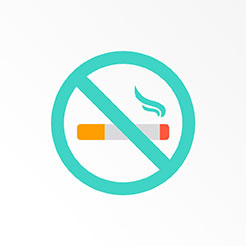Smoking Cessation / Quitting Smoking
Nicotine is the psychoactive drug in tobacco products that produces dependence. Most smokers are dependent on nicotine, and smokeless tobacco use can also lead to nicotine dependence. Nicotine dependence is the most common form of chemical dependence in the United States. Research suggests that nicotine is as addictive as heroin, cocaine, or alcohol.
Quitting tobacco use is difficult and may require multiple attempts, as users often relapse because of withdrawal symptoms, which may include irritability, anxiety, difficulty concentrating, and increased appetite.
From Our Collection
Health Benefits of Quitting:
- People who stop smoking greatly reduce their risk of dying prematurely. Benefits are greater for people who stop at earlier ages, but cessation is beneficial at all ages.
- Smoking cessation lowers the risk for lung and other types of cancer. The risk for developing cancer declines with the number of years of smoking cessation.
- Risk for coronary heart disease, stroke, and peripheral vascular disease is reduced after smoking cessation.
- Coronary heart disease risk is substantially reduced within 1 to 2 years of cessation.
- Cessation reduces respiratory symptoms, such as coughing, wheezing, and shortness of breath. The rate of decline in lung function is slower among persons who quit smoking.
- Women who stop smoking before or during pregnancy reduce their risk for adverse reproductive outcomes such as infertility or having a low-birth-weight baby.
Tobacco Use Cessation Methods:
- Brief clinical interventions by health care providers can increase the chances of successful cessation, as can counseling and behavioral cessation therapies. Treatments with more person-to-person contact and intensity (e.g., more time with counselors) are more effective. Individual, group, or telephone counseling are all effective.
- Pharmacological therapies found to be effective for treating tobacco dependence include nicotine replacement products (e.g., gum, inhaler, patch) and non-nicotine medications, such as bupropion SR (Zyban®) and varenicline tartrate (Chantix™).
Source: Centers for Disease Control and Prevention - Office on Smoking and Health
Self-Help Groups
Apps
quitSTART
A free app that helps you quit smoking with tailored tips, inspiration, and challenges.
Learn MoreStay Quit Coach
 A free, easy-to-use app designed to help you quit or reduce use of cigarettes, electronic nicotine delivery systems, cigars and chewing tobacco. The app helps users identify their personal reasons for quitting, set goals, and track their progress over time.
A free, easy-to-use app designed to help you quit or reduce use of cigarettes, electronic nicotine delivery systems, cigars and chewing tobacco. The app helps users identify their personal reasons for quitting, set goals, and track their progress over time.
Learn more on the VA website.
Locate a Treatment Facility
Fact Sheets
Videos
Trainings
Smoking Cessation: Past, Present, and Future (CDC)
Curricula & Lesson Plans
- A Workbook to Create Your Personal Plan to Overcome Nicotine and Tobacco Dependence
From the University of California San Francisco





